Vaccinations for Vietnam: What you should know before you go
Vietnam is a beautifully tropical country filled with some of the warmest and friendliest people you’ll ever meet. From the chaotic streets of Hanoi to the...

Preparing for a trip to Vietnam? You’re likely creating and working out a travel budget. However, your own spending habits aren’t the only ones you should take into consideration. Some countries are still very cash-oriented, while people in others prefer cashless payments.
Most Vietnamese locals primarily use cash, but card payments are becoming increasingly more popular. If you’re going to be travelling to well-known tourist areas, you’ll be able to pay for almost everything by card. However, there are still certain situations when you might need cash.
In this article we’ll cover the different payment options and explore which is more convenient; cash or card in Vietnam? We’ll also show you a cost-effective way to handle your finances while travelling to Vietnam.
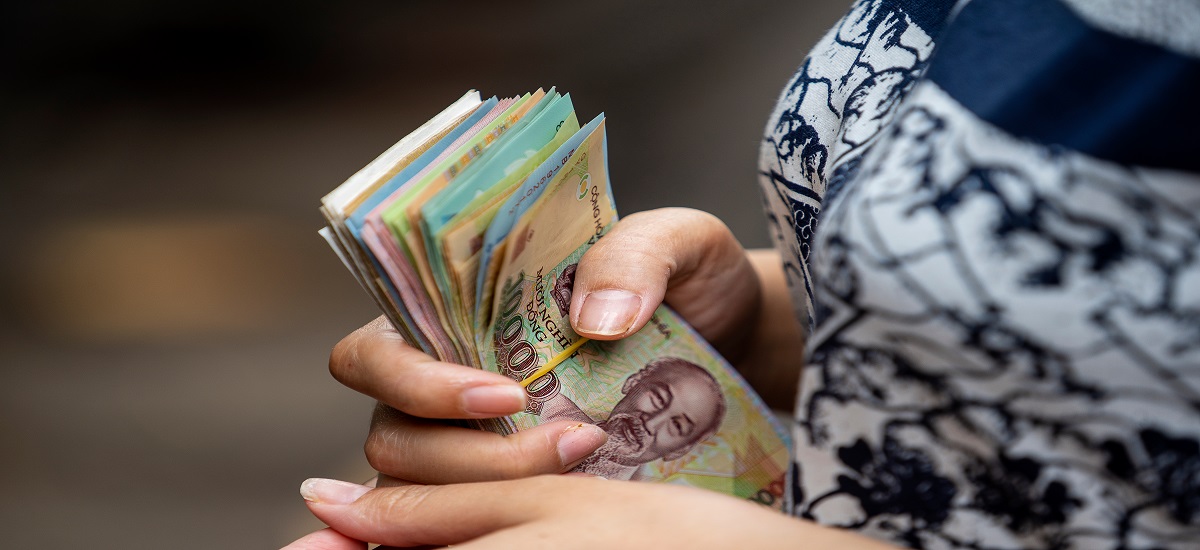
Although many people still prefer paying with cash in Vietnam, its use is rapidly declining. In the past years, the number of cash payments dropped by 30 percent. On the other hand, both cards and mobile wallets are becoming growingly popular.1
That said, keeping smaller denominations of Vietnamese dong on you will come in handy for many reasons, including tipping. Small bank notes are also good for small purchases and market visits.
Tipping is not part of Vietnamese culture, but it has become common over time due to foreign influence. Tourists frequently tip on private tours and when visiting beauty salons or restaurants. When calculating your tip, remember the difference between Vietnamese dong and pounds. What might seem like an astronomical amount of money is actually only a couple of pounds.2
Want to work out exactly how much things cost? Explore our live Vietnamese exchange rate currency converter.
Even though everything might seem cheap at markets, don’t be afraid to bargain. Bargaining is part of the authentic Vietnamese experience and it’s allowed as long as you’re respectful.
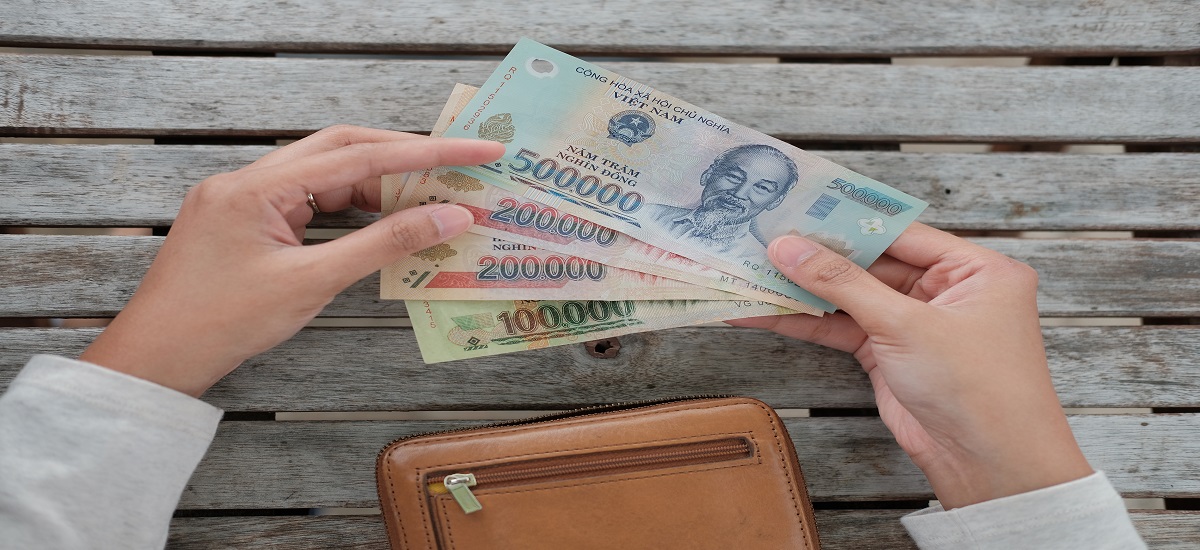
We’ve listed some common situations where you’ll be paying for things in Vietnam. Here’s whether you’ll be able to pay by card, in cash or both:
| Payment for... | Card💳 | Cash👛 |
|---|---|---|
| 🚕 Taxis | Sometimes (when booked via taxi booking apps)³ | Yes |
| 🏪 Convenience stores | Usually | Yes |
| 📿 Temples | Sometimes | Yes, often preferred |
| 🚌 Public transport | Depends on transport | Yes |
| ☕ Restaurants and cafés | Usually | Yes |
| 💅 Spas and massage parlours | Yes | Yes |
There are plenty of ATMs in Vietnam, especially in tourist areas and bigger cities. Locating one won’t be an issue, since they can be found in convenience stores, at airports and next to bars or restaurants. There’s many of them since there are many banks in Vietnam, both local and international. Foreign banks in Vietnam include Citibank and HSBC.
The majority of Vietnamese ATMs accept Visa cards, but other foreign cards are accepted too. In case an ATM doesn’t support your card type, you can go to a foreign bank and try there. ATM withdrawal limits range between 2 million and 10 million VND per transaction and they’re higher at international bank ATMs.2
Top tip: When using an ATM anywhere abroad, always withdraw cash in the local currency. Doing so will help you avoid higher exchange rates. Check with your bank or card provider before you travel if there are limits on the amount you can withdraw daily.
International debit cards are widely supported in Vietnam, both for ATM withdrawals and for everyday spending. You can use your UK debit card freely in restaurants, hotels, spas etc. However, if you plan on visiting smaller towns, bring some cash with you as well.
The Wise card is a great option if you don’t want to bring a lot of cash, you can use it for payments and to withdraw cash at ATMs.
Learn more about the Wise card 💳
Yes, most establishments in Vietnam will accept your UK-issued credit card.
Although Vietnam is moving towards becoming an almost cashless country in the future, there’s still a long way to go. Cash is still used everywhere, from hotels and taxis to street stalls and temple entrance tickets. If you’ll be going to towns and villages that aren’t as popular among tourists, you’ll have to rely on cash only.
Cash is a good option for smaller purchases or tipping. When you tip in cash, you’re making sure that the specific person that served you receives the tip. Keeping small denominations on hand will have you prepared for any of these situations. Just remember that the smallest banknote in circulation in Vietnam is a 100 VND bill.4
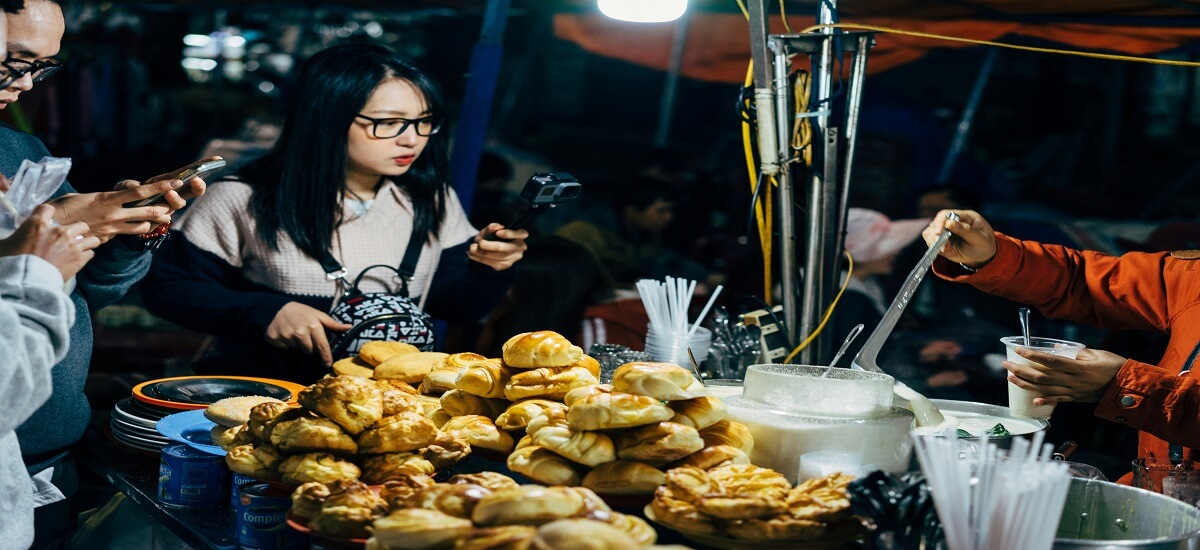
You’ll quickly find that cards are accepted and welcomed in most Vietnamese tourist areas. Besides street vendors and smaller shops, pretty much everyone accepts cashless payments. Using cards is certainly more convenient than having a wallet full of foreign currency.
If you don’t plan on staying in Vietnam for too long, cards are a handy time-saving option. You won’t have to walk around finding ATMs or exchanging offices. You also won’t end up with leftover cash you can’t spend at home.
If you’re travelling through bigger cities, you’ll notice how many Vietnamese businesses support contactless payments. They’ve also become more popular for health reasons.2
Besides using cash or cards in Vietnam, other payment methods are available.
Vietnam has one of the highest cashless payment adoption rates in southeast Asia. This is especially noticeable when it comes to e-wallets. The number of users is only expected to grow, especially since there are many Vietnamese apps on the rise.5
MoMo is the most popular digital wallet in Vietnam at the moment. You can connect it to your Mastercard or Visa card and pay like a local.6 There are also digital wallets and QR payment apps only citizens can use, since they need to be connected to Vietnamese bank accounts.
Popular mobile payment options such as Apple Pay and Google Pay are also available for use in Vietnam.7
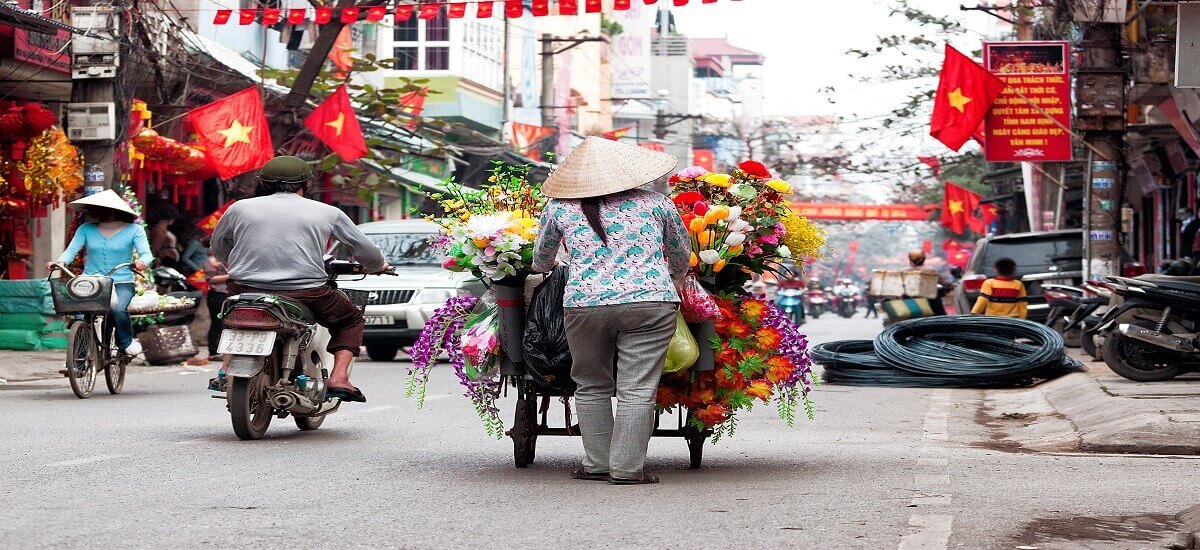
Cashless means of payment are becoming the norm in Vietnam. If you’ll be visiting Hanoi or some other popular city, you can fully rely on your card.
However, if you’re the more traditional type, you can use cash anywhere. It’s still the primary payment method and you won’t run into any places that don’t accept it.
No matter what you choose, it’s advisable to have at least some cash on you.
Want to spend like a local in 150+ countries, including Vietnam, without worrying about exchange rates and hidden fees? The Wise card might be just the thing you’re looking for.
The Wise card can be used for any international payments, including accommodation costs and daily expenses. It automatically converts the currency at the mid-market exchange rate with only a small, transparent currency conversion fee*.
You can also use it to easily withdraw dong from the ATMs in Vietnam.
Learn more about the Wise card 💳
To summarise, here are some of the most frequent questions about using cash or cards in Vietnam.
That greatly depends on your spending habits, but Vietnam is fairly cheap. You can always withdraw more money if you end up needing it.
Yes, UK debit cards are accepted in Vietnam.
ATMs in Vietnam have different withdrawal fees, but they start at around 30,000 VND. Sometimes they don’t even display the charged fee amount.
If you have a Wise card, it automatically converts currencies at the mid-market exchange rate with a small conversion fee*.
Sources used:
Sources last checked on date: 17-Apr-2024
*Please see terms of use and product availability for your region or visit Wise fees and pricing for the most up to date pricing and fee information.
This publication is provided for general information purposes and does not constitute legal, tax or other professional advice from Wise Payments Limited or its subsidiaries and its affiliates, and it is not intended as a substitute for obtaining advice from a financial advisor or any other professional.
We make no representations, warranties or guarantees, whether expressed or implied, that the content in the publication is accurate, complete or up to date.

Vietnam is a beautifully tropical country filled with some of the warmest and friendliest people you’ll ever meet. From the chaotic streets of Hanoi to the...

While the U.S. Dollar is widely accepted in Vietnam, it’s often better to pay in the local currency - the Vietnamese Dong.Shops, restaurants, taxi drivers and...
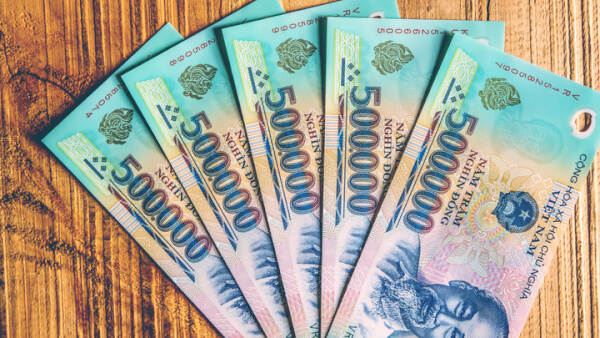
The first six months of 2016 saw over 4.7 million foreign visitors arriving in Vietnam - an impressive 21% increase on the previous year. If you’re planning a...